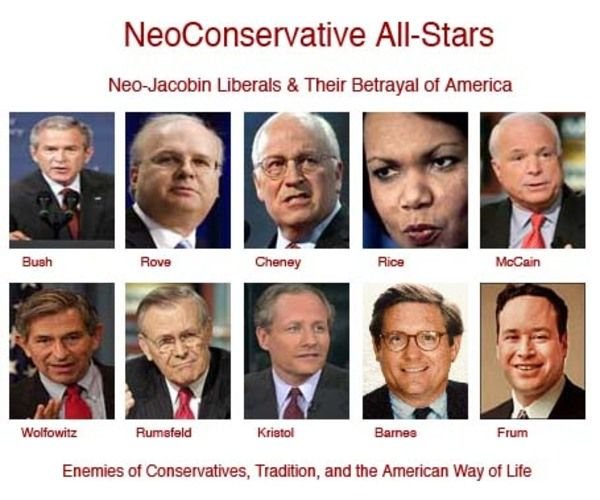What's the Difference Between Neoliberalism and Neoconservatism?
After examining neoliberalism in my PhD thesis from the point of view of the Governmentality theorists, which I think have the most comprehensive critiques of neoliberalism. People mix up the two ideologies of neoliberalism and neoconservatism, but I think this is because they actually have overlaps.
Let me try to explain from a sociological point of view as best I can.

The Neoliberals (source: uncomputing.com)
Neoliberalism is founded on the principles of the sanctity of the individual. This involves ‘empowering’ the individual in a range of ways. So, the state governs ‘at a distance’ as the Governmentality theorists say. What this means to me is that the state promotes self-regulation as a form of empowerment but that this goes hand-in-hand with state regulation, not of markets, but of individuals. Those who can self-regulate their lives (ie, run their life as a business) theoretically gain the benefits of society; those who can’t regulate their own lives, can access the welfare provisions of the state, albeit at a more restricted and surveilled level than under the welfare state. Neoliberals can be quite socially progressive, but only in relation to that part of the population who can self-regulate. So, the social side of society is taken care of in the above manner.
This is also helped along by the ‘psychologisation’ of society in which the ‘psy’ sciences become almost the surveillance arm of the state, infusing itself into the state bureaucracy through increased testing for all manner of new ailments associated with the failure to self-regulate, and into society through the ‘self-help’ movement in which positive thinking (and other methods) become associated with self-empowerment.
Economically? My understanding is that neoliberalism is aligned with market-based economics, but that the state has a (somewhat) interventionist role to play as well in ‘ensuring’ that the market functions well (depending on the Austrian or the American strain of neoliberalism). But this is complex because it is tied up to the first lot of points I made in that, along with the self-regulation and self-empowerment of the individual, and the ‘governing at a distance’ of the state, comes a whittling away of the size of the state as the individual (theoretically) becomes more ‘responsible’ for their own welfare. It seems that, from an economics point of view, the role of the neoliberal state is quite non-ideological and that quite often, they seem to lurch from crisis to crisis with ‘band-aid’ solutions. This is because, for the neoliberal, there is no utopia.

The Neoconservatives (source: 2012patriot.wordpress.com)
Now we come to the neoconservatives, so let me speculate: the neocons believe in the hegemony of their own power in the world. The roots of this position haven’t changed much over the last 100 years or so, at least in the USA. In the US, it is based on American exceptionalism, the power of the elites, the always strong link between the state and the corporate sector (bordering at times on fascism), and a strong military to enforce this globally. Economically, they seem to believe less in the free market (for themselves) than the neoliberals, and yet they enforce the free market for the rest of the world.
But … and this is where it gets messy and why I believe that people get the two ideologies mixed-up ... at the domestic economic level, they appear to take the lead from neoliberal ideology, using the language of self-empowerment but taking it to the extreme by cutting off all forms of support for those who cannot self-regulate.
What do you think?
Thanks for sharing...
No problem @samwicallis
This post recieved an upvote from minnowpond. If you would like to recieve upvotes from minnowpond on all your posts, simply FOLLOW @minnowpond
Thank you!
Good luck @drrobertmuller 👍